Drew Myron's Blog, page 6
September 11, 2024
A Moment in Time: Postcard Poems
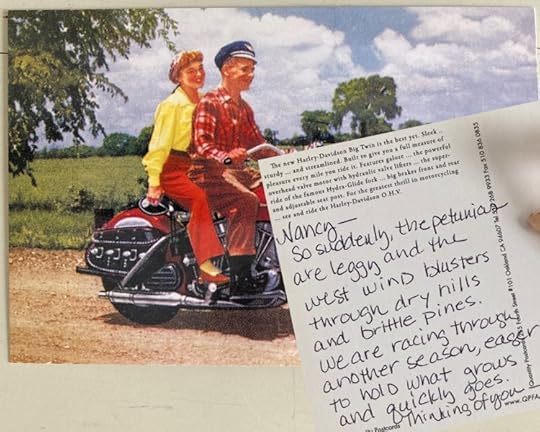
Touring Season — a postcard poem by Drew Myron
Quick, write me a poem —
just a line will do, then
another. Letting go
is all it takes.
The best thing about the annual Poetry Postcard Fest is that it strengthens your creative will.
As with the traditional postcard sent while traveling, poem-messages are written in present tense, capturing small moments of the everyday. Like a freewrite, the poems are spontaneous and original, with little planning and no editing.
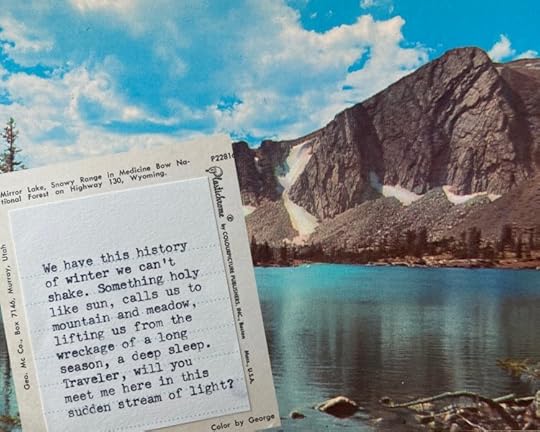
Good Medicine — a postcard poem by Drew Myron
What’s the key to postcard poetry success?
“Learning to trust your gut and not worrying about writing a ‘bad poem’,” says Paul Nelson, creator of the Poetry Postcard Fest. “Learning to put poetry closer to the front of your life’s focus once the fest starts (only for a few weeks) and look at everything as potential material for a poem.”

Still — a postcard poem by Drew Myron
It’s good advice, and it works.
The daily ritual readied me for the art of noticing: weather, landscape, light, mood, and more. And with practice I grew to trust my instincts and the mystery that rolled from my pen.
Unfortunately, my penmanship is messy. Quickly, I turned to my typewriter and discovered my typing skills are rough, too. My fingers are still sore from my old, but trusty, Royal Quiet De Luxe.
Typing slowed me down, and I grew to appreciate the clack of stuttered keys and slipping ribbon. Paired with an assortment of vintage postcards, I stepped into another time and place.
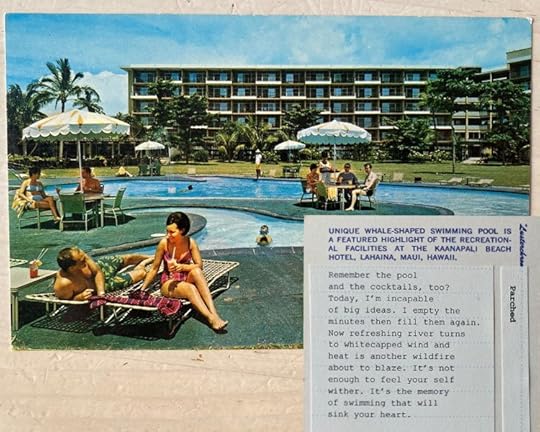
Parched — a postcard poem by Drew Myron
The poems I wrote each day for a month are likely not keepers. But no matter, the process planted seeds and exercised the writing mind. Spontaneous writing — and blindly sharing, with no edits, erasures, or fear — is a great way to stretch your creative possibilities.
I’m already collecting postcards for the 2025 Poetry Postcard Fest.
September 7, 2024
The Art & Joy of Postcard Poems
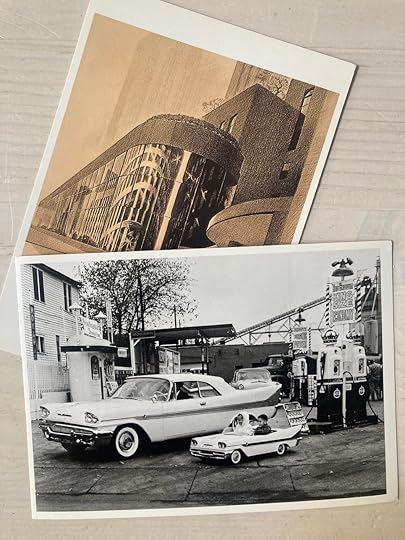
Well, that was fun!
The 18th Annual Poetry Postcard Fest just finished, and I had a great time.
The Fest is an annual worldwide literary event in which participants write and send 31 poems in 31 days. This year, over 600 poets took part, writing from 48 U.S. states, four Canadian provinces, and 10 countries.
For me, it was a fantastic exercise in daily, shortform writing. I thrive with structure and a nudge. And it was a delight to open my mailbox each day to new poems and postcards, many handmade works of art. Each postcard shined with its own content and style, from evocative phrases to piercing inquiry, from quips and puns to nature-based observations. In a good effort, you can feel the moment slow as image ignites and language distills. I love that moment.
Here are a few of my favorites:
Is a broken heart . . .
This postcard, with its seeming simplicity, is a beauty. An abstract handstamped design is accompanied by exacting language that reminds me of Pablo Neruda’s The Book of Questions, which at first feel silly and then quite profound. Poet Maryrose Larkin says her postcard poems are often “seeds that will grow into other poems.”
And I only know that because I reached out to writers for permission to share their work — and that’s another special part to the annual postcard event: mystery & surprise. For the Poetry Postcard Fest, you write, send, and receive poems to and from people you do not know. It feels like tossing thoughts into the air, uncertain how they may land. And then in the process, you discover the landing does not matter. It’s the act of making that prevails.

Is a broken heart . . . by Maryrose Larkin
Backhand
This creative collage is so intriguing. For the Fest, artist-poet Joanna Thomas created over 40 original collages, each with what she calls a “word ditty.”
“The dictionary page is vintage, each page glued to cardboard from sources such as saltine boxes, which I collect and trim to postcard size,” she explains. “The portraits are photocopies of Rembrandt's paintings. Then I cut/paste images from Vogue or wherever to create visual confusion. It's fun.”
Joanna’s work has been featured in numerous art exhibitions and poetry chapbooks.
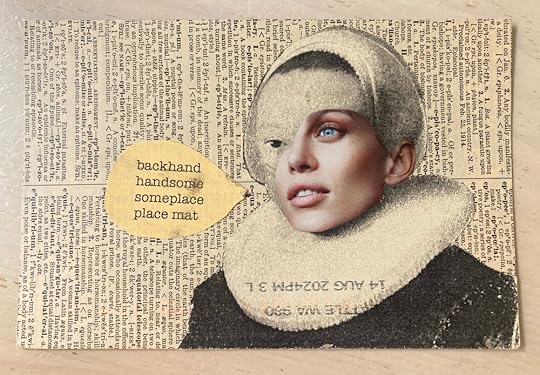
Backhand . . . by Joanna Thomas
Greater Roadrunner
This postcard poem from Jennifer Johnston carries a quiet loveliness, a moment captured.
And I can read the handwriting! Creating a spontaneous poem in a small space is difficult enough without adding the challenge of human scrawl. I envy good — or even clear — penmanship. And that’s another aspect of the Fest that appeals to me: writing by hand. These days we so rarely write by hand, or see the hand of others. It’s like a fingerprint; no two are alike. For a postcard moment, I “see” you.

Greater Roadrunner . . . by Jennifer Johnston
It’s a treat to get real, old-fashioned, feel-good mail. Try it! Write a line. Capture a scene, a feeling, a fleeting now. You may be surprised at the power of making and releasing your work into the world.
* * *
The world turns on words. Thank you for reading & writing.
• If you know someone who might enjoy this blog — please share.
• If you want to read more — subscribe for free.
• If you are here, reading this now — thank you!
August 29, 2024
Thankful Thursday: Tomato Blues
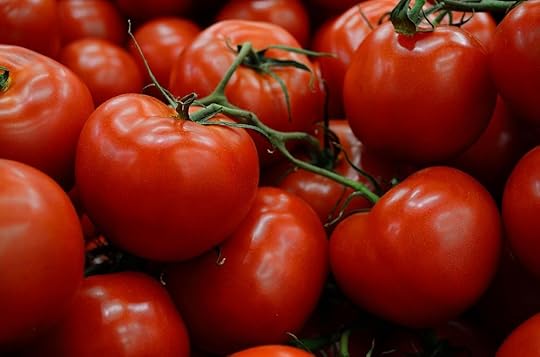
The world is large, my gratitude small.
Do you know the long stretch between knowing and feeling? Intellectually, I know the world is rich with beauty but lately my heart feels too cramped to feel the magic.
Don’t worry, it’s only sadness talking. She returned this week, a damp seeping that began with a drip drip drip and quickly reached saturation. This will pass. It always does. I’m not drowning, just waving (with apologies to Stevie Smith).
A bout of the blues can really sour the search for thankfulness — but that, of course, is when I need gratitude even more.
Please join me in Thankful Thursday, a weekly pause to express appreciation for people, places, things and more. Big or small, practical or profound, attention attracts gratitude, and gratitude expands joy, and my gratitude grows when shared with you.
If gratitude is an act of attention, this week I am working hard to live wide awake to the world. Sadness wants to sap your strength, turn you inward, make you small. In this funk, looking out is more action than I think I can muster and exactly what I need.
Please note, that yes, I am writing with great emphasis. Some days italics and exclamations (!) are excellent props for the enthusiasm I can’t quite reach. Punctuation can be a very cheery companion, for which I am thankful.
To that end: tomatoes!
Can you believe the bounty?! It’s harvest time and I’m eating tomatoes morning, noon, and night. Tomatoes and salt. Tomatoes and balsamic. Tomatoes and cheese. Tomatoes sliced, diced, pureed. Tomatoes in eggs, in salads, in soups, in everything.
Every year I am stunned with deliciousness. How quickly I forget how good the world can taste, how easy it is to feel lifted and light. With this fresh and wild sweetness, sadness has no room to grow.
And that’s my secret: starve sadness, eat tomatoes!
What are you thankful for today?
Ode to Tomatoes
by Pablo Neruda
The street
filled with tomatoes,
midday,
summer,
light is
halved
like
a
tomato,
its juice
runs
through the streets.
In December,
unabated,
the tomato
invades
the kitchen,
it enters at lunchtime,
takes
its ease
on countertops,
among glasses,
butter dishes,
blue saltcellars.
It sheds
its own light,
benign majesty.
Unfortunately, we must
murder it:
the knife
sinks
into living flesh,
red
viscera,
a cool
sun,
profound,
inexhaustible,
populates the salads
of Chile,
happily, it is wed
to the clear onion,
and to celebrate the union
we
pour
oil,
essential
child of the olive,
onto its halved hemispheres,
pepper
adds
its fragrance,
salt, its magnetism;
it is the wedding
of the day,
parsley
hoists
its flag,
potatoes
bubble vigorously,
the aroma
of the roast
knocks
at the door,
it’s time!
come on!
and, on
the table, at the midpoint
of summer,
the tomato,
star of earth,
recurrent
and fertile
star,
displays
its convolutions,
its canals,
its remarkable amplitude
and abundance,
no pit,
no husk,
no leaves or thorns,
the tomato offers
its gift
of fiery color
and cool completeness.
August 19, 2024
Blue Moon Monday

A 1910 photo of the Kwakwakaʼwakw, also known as the Kwakiutl, an indigenous people who used outrigger canoes as a source of travel through the Pacific Northwest region of North America. Source: Wikimedia Commons
Full Moon Paddle on the Columbia River
This is something we’ll never forget, he says.
Over the hillside, a full moon rises to fill the night and
brilliance ribbons the river in light. The paddle catches
water as I reach through the dark. Together we lean and pull,
arms, legs, shoulders, hearts.
Like a camera, the mind sorts and records, click, click, click
and I wonder what memories will keep:
this wash of shadow and shine, our laughter and sighs,
the train rumbling suddenly alongside our calm?
Or maybe the water — how warm and smooth, and
our voices easy so late at night
as if we are secrets slipping into dreams.
As if we are dreams slipping into life.
— Drew Myron
It’s a Monday and a Supermoon Blue Moon.
It’s a good day (and night!) to make something:
lists, letters, meals, memos, poems, pictures,
cookies, collage, stories, songs, drawings, dreams,
and delights. Please join me. Make something now!
* * *
The world turns on words. Thank you for reading & writing.
• If you know someone who might enjoy this blog — please share.
• If you want to read more — subscribe for free.
• If you are here, reading this now — thank you!
August 11, 2024
Fast Five with Paul Nelson
 “Writing ought to be a way to learn about the self. To build a soul.”
“Writing ought to be a way to learn about the self. To build a soul.” — Paul Nelson
Welcome to Fast Five, an occasional series in which I ask my favorite writers five questions as a way to open the door to know more.
Paul E. Nelson is a prolific poet, interviewer, broadcaster, and collaborator. As founder-director of the Cascadia Poetics LAB and Cascadia Poetry Festival, he has created and produced hundreds of events and interviews with poets and activists.
He co-created the Poetry Postcard Fest, an annual worldwide literary event and self-guided practice in spontaneous composition in which participants send 31 original poems on postcards to a list of recipients. Now in its 18th year, the Fest includes over 600 poets from 48 U.S. states, four Canadian provinces, and 10 countries. [Sidenote: I’m taking part in the event this year and basking in the pleasure of writing and receiving poetic postcards].
Paul has authored over a dozen books, including, A Time Before Slaughter, American Sentences, 56 Days of August: Poetry Postcards, and many more.
He lives in the Rainer Beach neighborhood of Seattle, Washington.
1.
How did you come to writing?
I was a broadcaster for 26 years and did writing for many of the jobs I had in radio from 1980-2006. After 1990 I produced a weekly radio interview program and in January 1994, I began syndicating that to as many as 18 stations a week. I wrote the introductions and questions and conducted the interviews. I also did post-production, wrote promotional announcements and underwriting credits. Once in syndication, I started interviewing poets, Allen Ginsberg, Michael McClure, Diane di Prima, Joanne Kyger, Wanda Coleman, Ed Sanders, Anne Waldman, Eileen Myles, Jerome Rothenberg, Victor Hernandez Cruz and many others. What a rush to put poetry on the air at major radio stations, though the time of day it aired was not the highest rated time slot. Inspired by these and other poets, I started writing poetry and attending the weekly Red Sky Poetry Theater open mic.
2.
Why did you create the Poetry Postcard Fest?
I had participated in the 3:15 Experiment for a few years but found the time of writing (3:15am every day in August) inconvenient. I loved the notion of having a writing project that would be conducted in August and told Lana Ayers, who was in my weekly writing critique group, about wanting to do something with postcards and she said: “I’ll help.” She did and then August turned into 56 days from July 6 to August 31. I did it in part to give folks the experience of spontaneous composition, but the fest unfolds its depth year after year, from the making of cards, to the graphic experience, to the community aspect, to the love of stamps and support of USPS (a huge part of The Commons), to being an antidote to social acceleration, and many, many other aspects.
3.
Please tell us about organic poetry.
Organic Poetry is a term used by Denise Levertov and Robert Duncan in the middle of their 20+ year correspondence. In her foundational essay “Some Notes on Organic Form” Levertov wrote: “it is a method of apperception . . . recognizing what we perceive . . . based on an intuition of an order, a form beyond forms, in which forms partake . . . Such poetry is exploratory . . . words which connote a state in which the heat of feeling warms the intellect.”
Similar concepts are known as “Projective Verse” and “The Practice of Outside.” These are all different takes on a spontaneous approach to poetry in which first take, or something close to the first take of a poem, is used and not extensive revision. Levertov noted that if extensive revision is required it is likely that the poem did not incubate long enough. How each poem written like this finds its own form is quite satisfying to me. My graduate thesis was a group of essays on the subject, which can be found here, along with other essays which in one way or another are related to this topic. The Poetry Postcard Fest is designed so people can have an experience of this kind, with deep attention to, and trust in, the moment of composition. It is a method which, at its best, allows for a connection to something larger than ego.
4.
You’ve interviewed hundreds of poets, artists, and activists. What have you learned?
I learned that Allen Ginsberg’s approach to composition was similar to meditation; that Jean Houston believes this is Jump Time and that we are “the people of the parenthesis” existing after the death of the old gods and before the birth of the new; from Joanne Kyger that we can learn how to write projectively; from Michael McClure that “if poetry and science cannot change one’s life, they’re meaningless”; from Bhagavan Das that our time is so potent that three days spent in meditation, or some other kind of devotional activity now, would have the same impact of 30 years of practice a century ago; from Father Matthew Fox that ritual will be a growth industry in the 21st century; from Nate Mackey that serial form in poetry may be the most open art form ever invented; from Brenda Hillman that we have permission to be strange; from Christina Baldwin that people gathering in a circle have access to the circle’s ancient powers; from Sam Hamill that our lives change when we take a Bodhisattva vow to poetry; from Peter Berg that we live on this land like invaders and that a bioregional ethos would change that, change our own selves and save the biosphere one bioregion at a time; and so on and so on . . .
5.
What’s the best writing advice you’ve received?
Various versions of the notion that abstractions and generalizations are used to cover something up, in poetry, usually a deeper gesture. “Abstractions have to be earned,” said Ezra Pound. Charles Olson warned about “the dodges of discourse” and about how Western Culture has abstracted itself from the very land on which it exists, which is at the core of our climate crisis right now and again validates my interest in bioregionalism.
Bonus Question: What do you wish I would have asked?
What is your ultimate goal in writing, or your reason for writing?
Writing ought to be a way to learn about the self. To build a soul. So many “award-winning poets” are unhappy, shallow or unpleasant people. I wonder why that is so? I suspect that by chasing fame, they strengthen their egos and, as Brenda Hillman said: “the ego project is doomed to fail.” What writing project is NOT doomed to fail?
I think the Saturation Job, the multi-decade research project, the project tied to place and tied to history of that place is bound to teach the poet something about the world and likely something about their own self. Poetry is so far out of the mainstream, to use mainstream (capitalist) objectives when considering the “success” of poetry, that is a tact that is doomed to fail.
* * *
The world turns on words, please read & write.
If you like this blog, please subscribe here
to get each post delivered to your email.
July 26, 2024
Good Books, Rereads & Reruns

The world is full of books, read one.
Oh, the lazy days of summer. I love this season, when the light is long and the hours stretch to include more reading, relaxing, and some unintentional re-reading.
Here are some of my latest favorites:
1.
Long Bright River by Liz Moore
I can’t stop telling people to read this book. Yes, it’s a “crime thriller mystery” but it’s so much more. Written in a beautifully spare style that runs emotionally and psychologically deep, this novel is smart, poignant, and incredibly moving. The book debuted in 2020 and was a New York Times bestseller, but somehow I missed it. The world is full of books, and thankfully, it seems we’ll never run out.
2.
History of Wolves by Emily Fridlund
A very unusual novel that beautifully balances a languid pace with eerie tension. There is a deep mystery to the tone that is both frightening and captivating.
(Because I gave the book to a friend, I didn’t include this novel in the photo above. Do you do this: press your favorite books into unwitting hands, urging them to read your latest love? Is this annoying? Please send me a line, let me know!)
3.
Commitment by Mona Simpson
I love Mona Simpson. I’ve been reading her since the 1990s (Egads, that’s “vintage” era!) and in the last decade I kind of lost track of her. A few months ago I was visiting one of my favorite bookstores and spotted this new novel. As usual, Simpson’s writing style is taut that manages to feel both spare and full. In this story of a family fractured by mental illness, the characters are vivid and flawed, and the sense of time and place is finely drawn.
(I gave this book away, too. What do you do with your favorite books?)
4.
Send Word: Poems by Donna Henderson
Send Word is an absolutely beautiful book, and finding this poetry collection has been an inspiring surprise. In this, her fourth book, Henderson skillfully blends evocative poetry with abstract art and sophisticated design. Henderson lives in Oregon, where she works as a psychotherapist, and is also a visual artist, singer, songwriter and accomplished poet.
(I’m keeping this book, though I did loan it, briefly, to a friend).
5.
Dear Life: Stories by Alice Munro
Confession: I didn’t like this short story collection when I read it in 2016. Then I forgot I read it and picked it up a few months ago — and loved it.
Oh, the power of time and change.
Munro is a master at fiction, and I’m just now understanding the praise she’s earned. To me, this paragraph sums the book, and, well, life:
“I did not go home for my mother’s last illness or for her funeral. I had two small children and nobody in Vancouver to leave them with. We could barely have afforded the trip, and my husband had a contempt for formal behavior, but why blame it on him? I felt the same. We say of some things that they can’t be forgiven, or that we will never forgive ourselves. But we do — we do it all the time.”
But with her recent death, that line now takes a grim view. It’s come to light that Munro’s husband sexually assaulted their daughter and that Munro was aware of the abuse and chose to stay in the marriage.
Oof, I don’t know what to do with this information. Can you love the writing while loathing the action? It’s an old debate. In literature, film, art, there are just too many examples of artists behaving more than badly (Woody Allen, Pablo Picasso, Diego Rivera . . . ) My mind churns on the schism between art and artist.
In lighter news . . .
6.
Rules of Civility by Amor Towles
I loved this book when it was published in 2011. Recently, a good friend was raving about the novel and I agreed with great enthusiasm. But when she got into details, I drew a blank. I have a bad book memory (see above) but rarely reread books (well, not intentionally). But this gem deserved a rerun and I was delighted to return to New York in the 1930s and an engrossing tale of art, culture and class.
7.
Table for Two: Fictions by Amor Towles
Quick on the heels of Rules, I swanned into Towles’ newest book, Table for Two, a fantastic collection of short stories. Sometimes I forget the feeling of really great writing. The way you get so immersed in the experience that you simply glide through the pages as the characters take shape and the plot unrolls with ease. The reader does not see the turbulence of trying, does not feel the clack and clang of the writer’s hard work. Instead, the experience is effortless. You simply feel the float.
(This is a library book, and I don’t want to give it back!)
In other reruns, I recently rewatched two great movies:
8.
The Visitor
This 2007 movie features a college professor who finds a new outlook on life thanks to an immigrant couple who accidentally move into his apartment. Actor Richard Jenkins, with his dry, understated delivery, brings this quiet movie to life.
9.
Born on the Fourth of July
Yes, Tom Cruise stars in this 1989 movie — but watch it anyway. I’m not a fan of the Cruise machine of blockbuster films, but in this one (and Magnolia, my all-time favorite film) he is a powerhouse. Oliver Stone directs this anti-war drama set during Vietnam, and the message is just as relevant as it was nearly 40 years ago.
I watched this movie on July 4, 2024, and it was an excellent counter to the rockets red glare madness that was blasting through my neighborhood.
Okay, that’s enough from me. I’m tired! Give me some energy, won’t you, and share with me your latest good books, rereads & rewatches. I always like to hear from you.
July 18, 2024
Thankful Thursday: Plenty
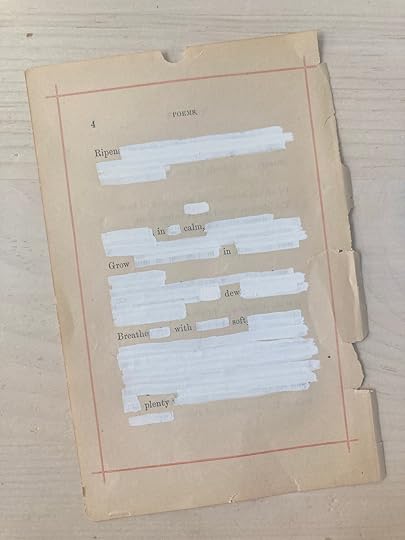
Plenty - an erasure poem by Drew Myron
Thank you for spending Thankful Thursday with me, for keeping me accountable, appreciative, and grateful for things big and small. Attention attracts gratitude, and gratitude expands joy, and my gratitude grows when shared with you.
Some days are more difficult than others, to sort through the grim, to find the good. Here's what I've found to appreciate this week:
It’s a season of abundance.
In the orchards nearby, cherries hang heavy on sun-drenched trees. We pick and pick, more than we can eat. Under the thick canopy of branches, the deep red fruit feels like unexpected treasure and we can’t believe the fortune we hold in our hands.
At home, the blueberry bushes planted last fall have produced an unexpected bounty. The skinny shrubs struggled through winter, then wind and rain, and finally emerged with dusty purple reward. It feels a miracle, this simple plenty.
But how long we waited for summer, for this fever of heat rising like a thermostat now measuring joy. We loll in the heat, until the oven is oppressive. Then quickly, we want escape from the string of 100-degree days. A friend likens the heat wave to hot yoga. “I pushed myself,” she says, explaining the merits of too-much. “I leaned into the heat and taught my body to adjust and my mind to accept.” The discomfort was turned into a physical and mental experiment in fortitude and plenty.
Plenty, abundance, appreciation. Want it, get it, know it, hold it. The theme runs through our lives.
With that in mind, I offer this praise of plenty:
Ode to Heat
Praise flip flops,
tank tops and
linen relief.
Praise the cool
tile floor and a
morning breeze.
The early birds
chirping to cherries
sweetening by
every degree.
Praise Otter Pops
and river swims.
Languid days and
breezy books.
Praise the beauty
of a frosted glass
and ice cubes rattling
in my tonic & gin.
Praise open
windows and
starry nights.
Praise this sun,
how easily it
erases the wreckage
of a winter long gone.
— Drew Myron
Please join me in Thankful Thursday, a weekly pause to express appreciation for people, places, things and more. Big or small, practical or profound, what are you thankful for today?
* * *
The world turns on words. Thank you for reading & writing.
• If you know someone who might enjoy this blog — please share.
• If you want to read more — subscribe for free.
• If you are here, reading this now — thank you!
July 1, 2024
On Independence
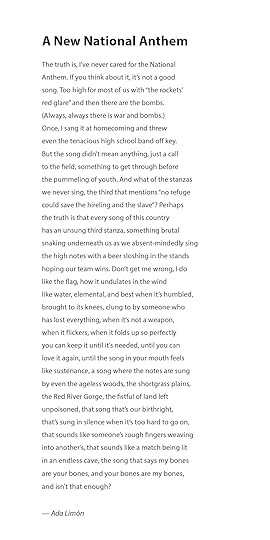
1.
Sometimes in deep quiet, clarity announces a fresh start and you have suddenly lost five pounds of worry and weight.
This is not that time.
Sometimes in the shower, sometimes late at night, in this sometime of now you are sitting in your bare yard, among weeds and tattered sky, sidelining a holiday of collective cheer.
2.
How did we get here?
Muddled for answers, questions become conversations that may never end.
3.
You’re looking for a different way to speak, you’re looking for beautiful things, impossible things, things to hold and touch, mountains and memories, stories and seasons to gather and release. You are looking for safety, for things that matter, like early in the year, early in the morning, late in the day, late in life, things you can never really know
when the screech of rockets red glare scatters your solace and you cannot remember the clear plans you had just yesterday on that long even drive beneath blue skies, along wide river, when the day welcomed you like an old friend and everything seemed more possible than you could believe.
4.
And now, jangled and jittered, there is nothing but a dark night, a blank page, and a gusty wind that could change your life.
5.
Tell me again, what does independence mean?
* * *
The world turns on words. Thank you for reading & writing.
• If you know someone who might enjoy this blog — please share.
• If you want to read more — subscribe for free.
• If you are here, reading this now — thank you!
June 20, 2024
Wish You Were Here . . .
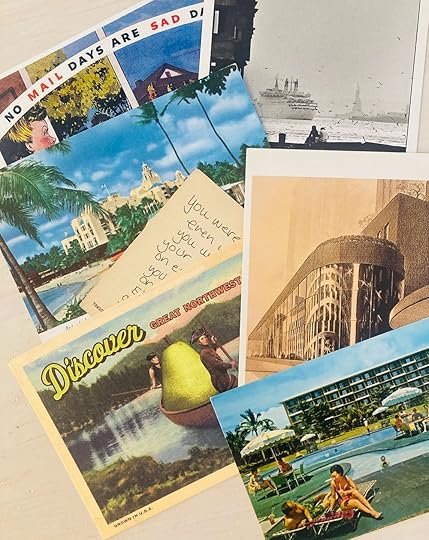
It’s postcard season, and I’m ready!
Once, a young friend went to Europe. “Send me a postcard,” I said as she departed. She arrived in the foreign country, purchased a postcard, and had no idea what to do.
Where do I write a message, put the address, place the stamp?
Some kind (and probably older) person taught the young writer the magic of postcard communication. Weeks later I received a colorful card filled with good cheer.
Like the rotary phone, stereo turntable, and film camera, the postcard harkens to early days and simple pleasures. Of slide shows, long strolls, and life without constant contact. And now, briefly, the past is present. Retro culture returns. Bring back the postcard!
To that end, I’m taking part in the annual Poetry Postcard Fest, a self-guided writing project that involves writing and receiving poems on postcards. The festival, launched in 2007, was created as an exercise of “both community and discipline” in which participants commit to writing 31 poems in 56 days, using limited space, and mailing the postcards to other participant poets around the world.
Join the fun! The event begins on July 4. Register here.
Writing a postcard is both challenge and delight. Like my young friend, I work hard to wrangle big ideas into small space. And really, this is an excellent exercise for all writers. Make every word matter. Prune, edit, prune more. Postcards, like poems, shine when they are vivid, concise, and image-heavy.
For the Fest, poets are urged to create first-draft originals by writing spontaneously, with limited (to no) editing. Rather than dazzle with polished poems, the Fest encourages creative stumbles and leaps. “The point is to experiment, stretch my subconscious’ mind-muscles,” explains Kat Bodrie, a longtime participant in the Poetry Postcard Fest. Founder Paul Nelson (with Lana Ayers) says the process is all about “having the guts to write without a net.”
Because I love freewriting, personal mail, and a good nudge, I’m eager to get started. Let’s work the writing muscle:
1. Join the Postcard Poetry Fest.
2. Too much of a commitment? Send me a postcard.
3. Or, let me send you a postcard poem. Send me your address, and I’ll send you a postcard poem.
4. Let the summer writing fun begin!
Need some postcard poem inspiration?
Village
Outdoors, a breeze
makes all the shrubs
look sociable.
White butterflies in a field
are the frayed handkerchiefs of those
who didn’t finish saying good-bye.
— Bert Meyers from Postcards
See also:
Postcard from the Heartbreak Hotel by John Brehm
Postcard by Olena Kalytiak Davis
A Certain Slant of Sunlight by Ted Berrigan
* * *
The world turns on words. Thank you for reading & writing.
• If you know someone who might enjoy this blog — please share.
• If you want to read more — subscribe for free.
• If you are here, reading this now — thank you!
June 12, 2024
Try This: Design Rules
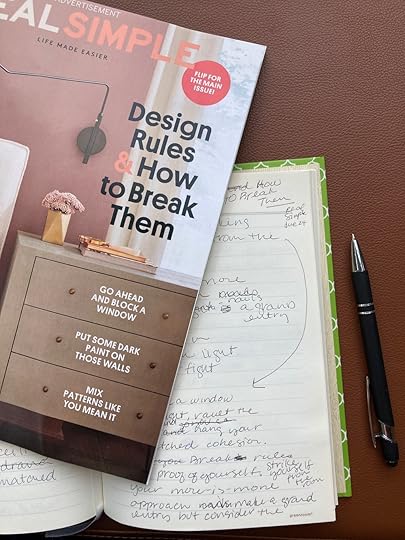
Remember the joy of magazines, those glossy print publications with large photos and worlds of possibility? Like the nearly extinct newspaper, the magazine has left the modern world, diminished in size, scale and popularity. Still, I like the shiny pages providing a peek into other worlds.
They also make an excellent writing challenge.
When I want low-pressure word play, I reach for the nearest magazine and make a scramble.
Here’s how: Flip to a page, copy words and phrases onto your own paper, then rearrange words, lines, and ideas to make your own poem. You can add words of your own, or increase the challenge by using only words from the magazine page.
A tip for the thrifty (me!): Get free magazines at your local library.
The scramble is a great writing warm-up, a good remedy for writer’s block, and a fun way to create unexpected word pairings that expand your creative power. The key is to stop making sense, while also creating some cohesion. Play with your words!
Design Rules
Never block a window.
Spindle strife. Vault
the ceiling and hang
your mismatched urges.
Your more is more approach
makes a grand entry but
here’s a smart trick: get small.
Strike yourself from the room.
Let in light.
— Drew Myron
created from Real Simple, June 2024
Your turn!
Make your own scramble (or scramble my scramble). If you feel moved, share your poem with me at: dcm@drewmyron.com
Want more word play?
Wordcatching
Cut Up
Overwrite
Headlines
Wild Card
I Remember
Where I’m From



